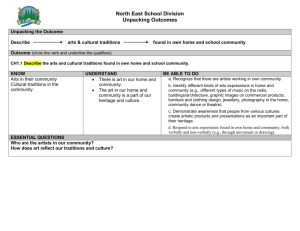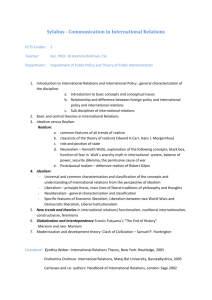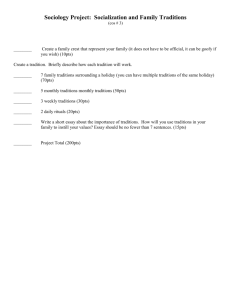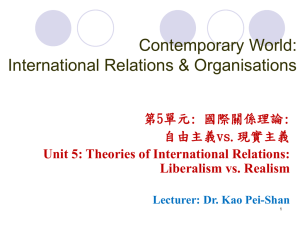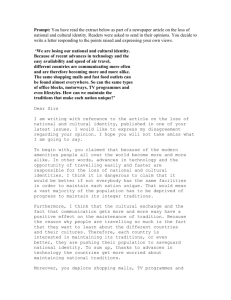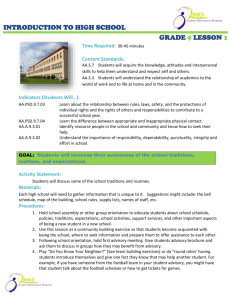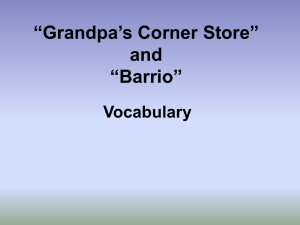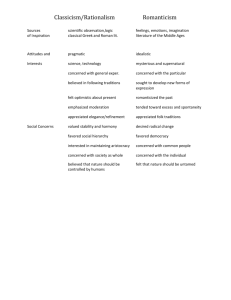See a Global Orientation sample syllabus
advertisement
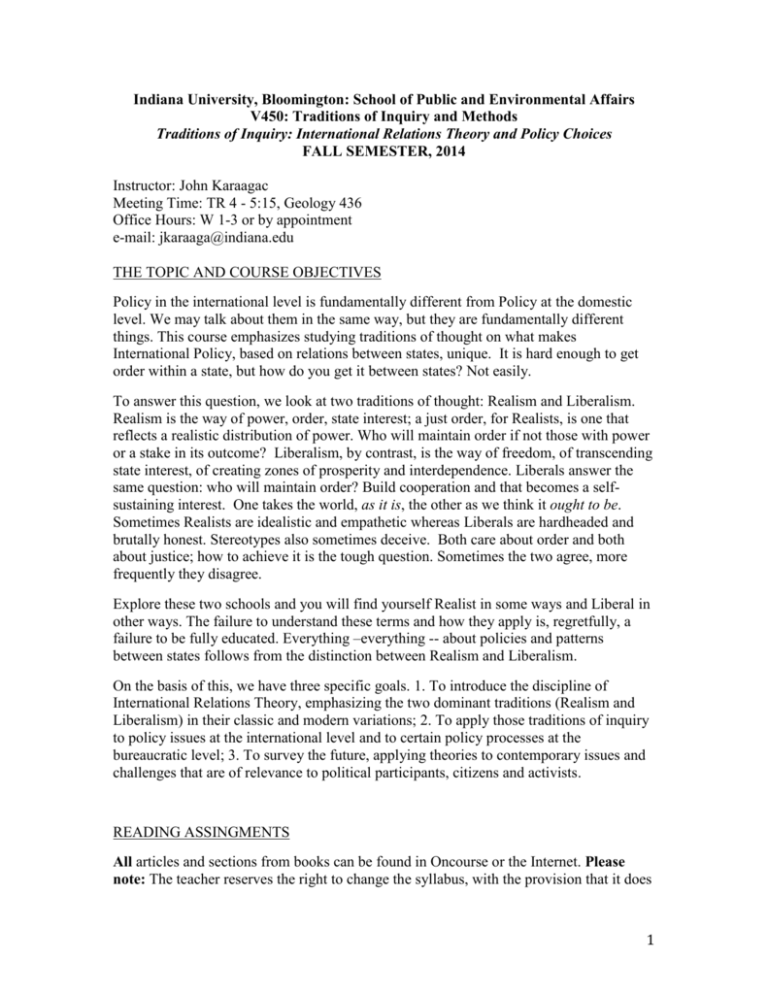
Indiana University, Bloomington: School of Public and Environmental Affairs V450: Traditions of Inquiry and Methods Traditions of Inquiry: International Relations Theory and Policy Choices FALL SEMESTER, 2014 Instructor: John Karaagac Meeting Time: TR 4 - 5:15, Geology 436 Office Hours: W 1-3 or by appointment e-mail: jkaraaga@indiana.edu THE TOPIC AND COURSE OBJECTIVES Policy in the international level is fundamentally different from Policy at the domestic level. We may talk about them in the same way, but they are fundamentally different things. This course emphasizes studying traditions of thought on what makes International Policy, based on relations between states, unique. It is hard enough to get order within a state, but how do you get it between states? Not easily. To answer this question, we look at two traditions of thought: Realism and Liberalism. Realism is the way of power, order, state interest; a just order, for Realists, is one that reflects a realistic distribution of power. Who will maintain order if not those with power or a stake in its outcome? Liberalism, by contrast, is the way of freedom, of transcending state interest, of creating zones of prosperity and interdependence. Liberals answer the same question: who will maintain order? Build cooperation and that becomes a selfsustaining interest. One takes the world, as it is, the other as we think it ought to be. Sometimes Realists are idealistic and empathetic whereas Liberals are hardheaded and brutally honest. Stereotypes also sometimes deceive. Both care about order and both about justice; how to achieve it is the tough question. Sometimes the two agree, more frequently they disagree. Explore these two schools and you will find yourself Realist in some ways and Liberal in other ways. The failure to understand these terms and how they apply is, regretfully, a failure to be fully educated. Everything –everything -- about policies and patterns between states follows from the distinction between Realism and Liberalism. On the basis of this, we have three specific goals. 1. To introduce the discipline of International Relations Theory, emphasizing the two dominant traditions (Realism and Liberalism) in their classic and modern variations; 2. To apply those traditions of inquiry to policy issues at the international level and to certain policy processes at the bureaucratic level; 3. To survey the future, applying theories to contemporary issues and challenges that are of relevance to political participants, citizens and activists. READING ASSINGMENTS All articles and sections from books can be found in Oncourse or the Internet. Please note: The teacher reserves the right to change the syllabus, with the provision that it does 1 not add to the course-load. The only book required for purchase is Michael Mandelbaum’s The Case for Goliath (New York: PublicAffairs, 2005). Despite this, Traditions of Inquiry/IR is a reading-intensive course. Be prepared to read the assigned tests and to read them well. These complex and sometimes difficult books and articles will serve you well in your undergraduate career and, beyond that, in your future as a policy-maker, analyst and citizen. There is no better way to become a better student, to master material and then to be a master of your fate (to the extent that anyone really can over the course of life), than to read and write and reflect. This is a course that prepares, or tries to prepare you, for life. MEASURING YOUR PERFORMANCE The final grade will be based on five papers (five to seven pages in length), four of which will be worth 100 points each. We will also grade on your capacity to add to critical discussion in class. You will be writing to a hypothetical policy-maker. The first paper will count for less (50 points) and will be a trial run. Peer evaluation will make up the balance of the points (50). After the first class, you are expected to have read all readings in a timely manner and be prepared to respond to reasonable questions. Participation is essential; failure to participate will negatively affect your grade. THE STRUCTURE OF THE CLASS Every course has a pattern. In this course, we break up the material into two parts. The first is with the traditions of thinking about order between states. Here, we begin our discussion of Realism and Liberalism and other traditions that follow from this division. We also consider the levels of analysis, that is, are we looking at the international, the domestic and the individual level? Some thinkers look only at one, others at all three. This is the foundation of all discussion that would follow. The second part deals with policy applications and cases. Sometimes Realists and Liberals have general agreement on certain applications; at other times they profoundly disagree. In light of this, we will look at bureaucracy and decision-making, misperception and the criteria of good and bad leaders. Then we will look at the central questions of international policy, that is, security and economic issues. Most relations between states involve force and protection, or trade and also protection, however it is defined. We will give thought to a just international order, to environmental issues, to development and to what some people call a global society, a concept that some fervently embrace and others doubt even exists. This is a course in which people who have given a lot of thought to these matters have fundamentally different positions. Where do you stand? We will end with some speculation about the future—about the future of your world... and mine. 2 CLASS OUTLINE: Part I: Traditions and Areas of Inquiry 8-28 9-04 9-11 9-18 9-25 10-02 10-09 Introduction: Theory, History and Levels of Analysis Realism in Theory and Policy: Core Assumptions Classical Liberalism in Theory and Policy: Core Assumptions Levels of Analysis; Anarchy; Sovereignty Hegemonic Stability Theory; Polarity Regimes and Interdependence Constructivism and Identity; Nationalism Part II: Policy Process and Applications 10-16 10-23 10-30 11-06 11-14 11-21 12-04 12-11 Bureaucratic Decision-Making Two-level Games and Leaders Terrorism Economic Dimensions: International Political Economy Global Inequality; Development Proliferation; Intervention; Transnational Civil Society IR and the Environment The Post-Cold War Environment Part I: Traditions and Areas of Inquiry Week 1. 8-28 Introduction: Theory, History and Levels of Analysis Steven M. Walt, “International Relations: One World, Many Theories,” Foreign Policy (Spring 1998); pp. 29-47 Hedley Bull, The Anarchical Society: A Study of Order in World Politics, (New York: Columbia University Press, 1977), chapter 1 E.H. Carr, The Twenty Years’ Crisis, 1919-1939 (New York: Harper Torchbook, 1964) Chapter 2 Week 2. 9-04 Realism in Theory and Policy: Core Assumptions Thucydides, “The Melian Dialogue,” in Richard K. Betts, Conflict After the Cold War: Arguments on Causes of War and Peace (New York: Longman, 2002), pp. 37-41 Niccolo Machiavelli, “Doing Evil in Order to Do Good,” in Betts, Conflict, pp. 42-46 3 Hans J. Morgenthau, Politics Among Nations: The Struggle for Power (New York: Knopf, 1954), pp. 3-13, 35-40 Henry Kissinger, Does America Need a Foreign Policy? (New York, Simon & Schuster, 2001), Conclusion Week 3. 9-11 Classical Liberalism in Theory and Policy: Core Assumptions Immanuel Kant, “Perpetual Peace,” [found in an Introduction to Contemporary Civilization in the West (Columbia University Press, 1946), pp. 878-90] Woodrow Wilson, “Fourteen Points” Edward D. Mansfield and Jack Snyder, “Prone to Violence,” The National Interest, Winter 2005-6 Michael Mandelbaum, The Ideas That Conquered the World, (New York: PublicAffairs, 2001), Introduction Paper One Assigned Week 4. 9-18 Levels of Analysis; Anarchy; Sovereignty J. David Singer, “The Levels of Analysis Problem in International Relations,” World Politics 14 (October 1961); pp. 77-92 Kenneth Waltz, Man, The State and War (NY: Columbia University Press, 2001), chapter 1 Stephen D. Krasner, Sovereignty (Princeton NJ: Princeton University Press, 1999) chapter 1 Paper One Due Week 5. 9-25 Hegemonic Stability Theory and Polarity William Wohlforth, “Stability in a Unipolar World,” International Security, Summer 1999 Christopher Layne, “The Unipolar Illusion: Why New Great Powers Will Rise,” International Security, 1993, pp. 5-51. Michael Mandelbaum, The Case for Goliath, chapter 1 Week 6. 10-02 Regimes: Liberal Institutionalism 4 Donald Puchala and Raymond Hopkins, “International Regimes: Lessons from Inductive Analysis,” International Organization, Vol. 36, No. 2 (Spring 1982) G. John Ikenberry, After Victory (Princeton, NJ: Princeton University Press, 2001) pp. 50-79 We will begin the following article: John Mearsheimer, “The False Promise of International Institutions,” International Security, 19 (3) 1994/5: 5-49 Paper Two Assigned Week 7. 10-09 Constructivism; Nationalism Alexander Wendt, “Constructing International Politics,” International Security, 20(1), 1995: 71-81 Thomas U. Berger, “Norms, Identity, and National Security in Germany and Japan,’ in Peter J. Katzenstein, ed., The Culture of National Security: Norms and Identity in World Politics (New York: Columbia University Press, 1996), pp. 317-56. Ernest Gellner on Nationalism, reading to be determined Paper Two Due Part II: Policy Process and Applications 10-16 Bureaucratic Decision Making Robert Jervis, “Hypotheses on Misperception,” World Politics, Vol. 20, No. 3 (April 1968), pp 454-79 Irving Janis, Groupthink (Houghton Mifflin, 1982, 2nd ed.), pp. 2-13, 174-197 Contemporary Case Study: to be determined Week 8. 10-23 Two-level Games and Leaders Robert D. Putnam, “Diplomacy and Domestic Politics: The Logic of Two-Level Games,” International Organization, vol. 42, no. 3 (Summer 1988): 427-460. 5 Daniel Byman and Kenneth Pollack, “Let us Now Praise Famous Men: Bringing the Statesman Back In,” International Security, Vol. 25, No.4 (Spring 2001) Henry Kissinger, A World Restored (Cambridge, MA: Harvard University Press, 1957), conclusion Week 9. 10-30 Terrorism Bruce Hoffman, Inside Terrorism (New York: Columbia University Press, 2006), Chapter 1, pp. 1-42 Audrey Kurth Cronin, “Behind the Curve: Globalization and International Terrorism,” International Security 27, (Winter 2002-03), pp. 30-58 Phillip Bobbitt, Terror and Consent (New York: Anchor, 2009), pp. to be determined Paper Three Assigned Week 10. 11-06 Economic Dimensions: Traditions of International Political Economy Adam Smith, Wealth of Nations, selection Hamilton, “Report on Manufactures,” selection Robert Gilpin, The Political Economy of International Relations (Princeton, NJ: Princeton University Press, 1987) chapter 1 Michael Mandelbaum, The Case for Goliath, chapter 3 Paper Three Due Week 11. 11-14 Global Inequality: the Question of Development Charles R. Bietz, “International Distributive Justice” John Rawls, “The Law of Peoples” Robert Tucker, The Inequality of Nations, section Amartya Sen, Development as Freedom (New York: Anchor, 2000) section William Easterly, The Elusive Quest for Growth (Cambridge, MA: MIT Press, 2000), pages to be determined Selection on the Asian Developmental State 6 Week 12. 11-21 Proliferation; Intervention; Transnational Civil Society Mandelbaum, The Case for Goliath, chapter 2 Reading to be determined on intervention Margaret E. Keck and Kathryn Sikkink, Activists Beyond Borders (Ithaca, NY: Cornell University Press, 1998) selection Paper Four Assigned Week 13. Thanksgiving Break Week 14. 12-04 International Environmental Policy Kate O’Neill, The Environment and International Relations (Cambridge, UK: Cambridge University Press, 2009) selection Selections from Daniel Yergin, Michael Klare and Elinor Ostrom Paper Four due Week 15. 12-11 The Post-Cold War Environment: Robert Kagan, “Power and Weakness,” Policy Review, June-July 2002 Aaron Friedberg, “The Future of U.S-China Relations: Is Conflict Inevitable?” International Security, Vol. 30, No. 2 (Fall 2005), pp. 7-45 Additional readings to be determined Week 16. Free Week: Final Paper Assigned. Due One week later. 7
